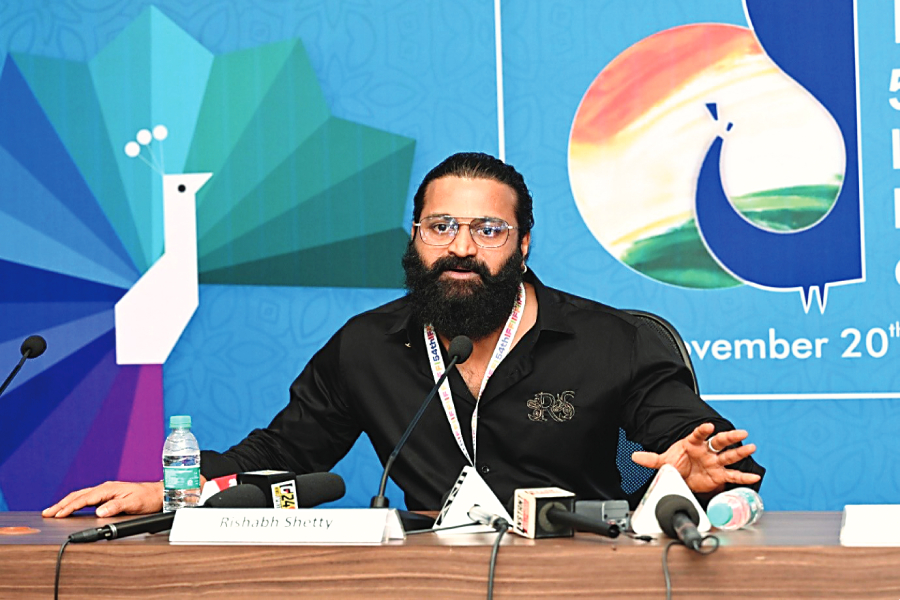Says an elated Rishab Shetty as he speaks to Our Bangalore after securing the Special Jury Award at recently concluded IFFI, in Goa
- May 14, 2024
- Updated 5:49 pm
Govt should push festival-honoured Kannada films to OTT
- Sudipto Mullick
- December 11, 2023
- Sandalwood
Kannada actor-director Rishab Shetty is basking in the glory of his recent achievements – both at the box office and in the realm of international recognition.
Following the “unexpected” global success of his folklore fantasy film Kantara, which raked in a staggering Rs 450 crore worldwide in 2022, Shetty has added another feather to his cap.
He emerged as the lone Kannada director to clinch the prestigious Special Jury Award at the International Film Festival of India (IFFI) held in Goa.
For Shetty, success is not merely about the numbers but revolves around presenting stories that bring a fresh perspective to the audience.
Staying true to this philosophy, he recently unveiled the first-look teaser of Kantara A Legend: Chapter 1, the much-anticipated prequel to the blockbuster Kantara.
In an exclusive conversation with Our Bangalore on the sidelines of IFFI in Goa, Shetty shared insights into his latest venture, discussed the significance of narrating stories rooted in India’s folklore, the concern of Kannada films losing viewership on OTT platforms and much more.
Read on…

OB: This is your second time in IFFI and you have a won the Special Jury Award. Must be very satisfying?
Rishab: I’ve had the privilege of visiting Goa four times, including two times for film festivals. Even when my film “Sa.Hi.Pra.Shaale, Kasaragodu” received the National Award for Best Children’s Film in 2018, I didn’t anticipate that recognition. My sole focus has always been on captivating the audience. This year’s Special Jury Award in the India Panorama section added another layer of significance to this Goa experience.
OB: Kantara’s prequel - Kantara A Legend: Chapter 1 - has been making all the right noises, was it written after Kantara became a big hit?
Rishab: Not in a screenplay format, but most of the core elements were already in place. During that crazy whim, I wrote down two stories (screenplays) because I actually wanted to make it in two parts (irrespective of its acceptance). Naturally, my friends we are thinking in terms of sequels (like in most Hollywood films). But I asserted, why not reverse the order. It actually started off with a very amateurish thought, but we put all our energies into it and now Kantara is a big hit.
OB: Kantara was more about conflict between nature and human; what's the logline of the prequel?
Rishab: We will delve into the backstory of the core folklore elements of the original movie, to uncover the origins of the revered deities – Panjurli Daiva, who is worshiped through a ritual known as Bhuta Kola, and Guliga Daiva, one of the oldest deities of the Tulu Nadu region. This hyper-local narrative will immerse viewers in a tale that’ll transcend time.

OB: You recently released the first look of prequel. When can we expect the release?
Rishab: We took 3-4 months to lock the screenplay of the prequel. We will start shooting in the coastal region of Karnataka by first week of December after leaving IFFI. We’re expecting a late 2024 release.
OB: For Kantara, we heard that you stayed in forest for a month to prepare for the shoot?
Rishab: In fact, the entire set is at a stone’s throw from my residence. In just two minutes from my home, you’ll find the set, and another 5 minutes will lead you to the picturesque patch of land. The entire location is nestled in the forest that lies just behind my residence.
OB: Will the prequel be a pan-India film?
Rishab: Yes, it will be a global release.
OB: Amidst all the jingoistic hullabaloo, with thematic films from North, East, and Central India trending in the last two years, your film from South vigorously stirs up the pot…
Rishab: I believe we should view our success as a responsibility. India is brimming with rooted stories and folklore—central to our narrative—possessing the inherent power to deeply connect with the audience, who embrace it as a personal story. This, I believe, is a key factor contributing to my film’s success.
OB: Your film delves into issues of global warming and human-nature conflict, which are universal concerns. How has the international audience reacted?
Rishab: We’ve been so engrossed in releasing the film in India that we didn’t actively pursue international avenues. However, during my visit to Washington to collect an award, I encountered a senator who highlighted similar challenges faced by native communities in America. Their struggle mirrors what I portrayed between the forest department and the tribes in Kantara. The essence is universal, and the issue resonates everywhere—it’s the same problem, regardless of the location.
OB: What challenges do you see in the current landscape of the Kannada film industry, particularly in terms of OTT acceptance and enhanced visibility?
Rishab: In the Kannada film industry, only two production houses are currently active – Paramvah, led by Rakshit Shetty, and my own. We are among the few actively producing films for the festival circuit, alongside some indie productions. Despite the surge of OTTs post-Covid, the acceptance of Kannada films has been hampered, primarily due to a few commercially-driven Kannada films on OTT platforms that did not resonate well. My humble request is for the government and the National Film Development Corporation (NFDC) to acknowledge and endorse festival films, which, due to their limited theatrical exposure, should be recommended to OTT platforms.

